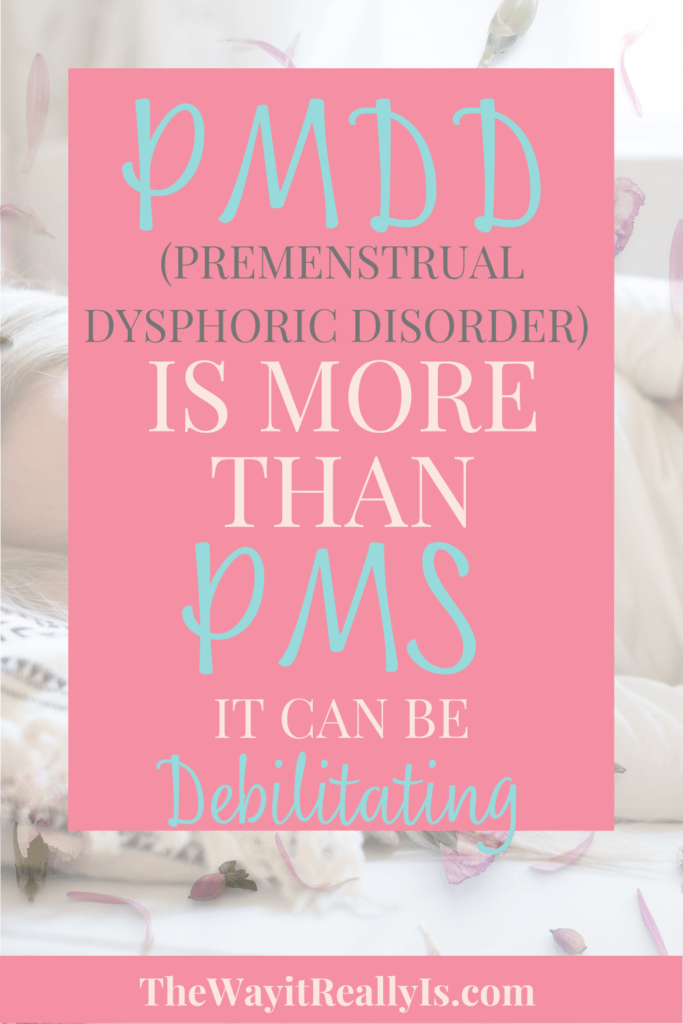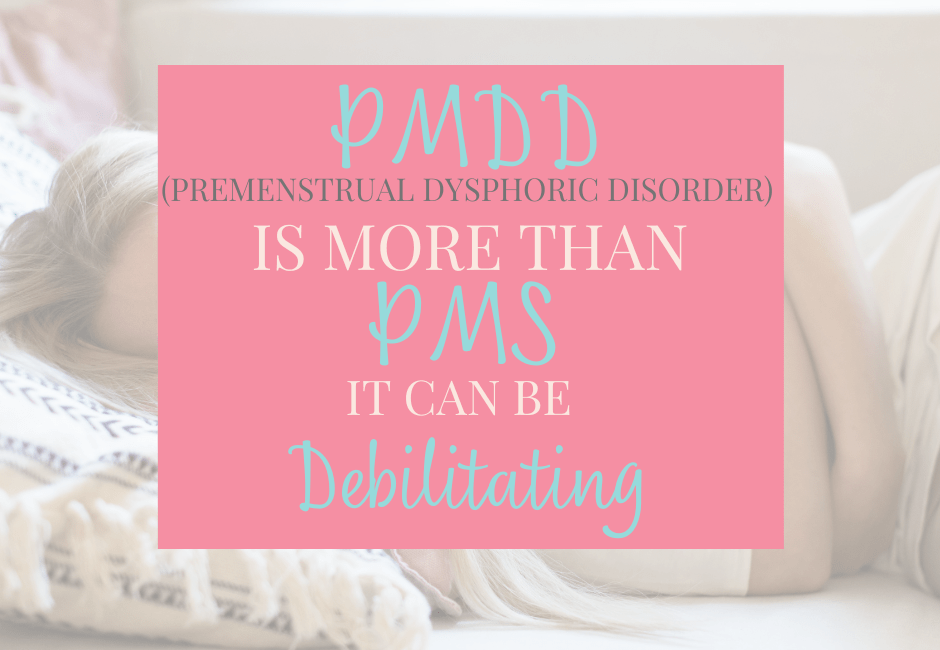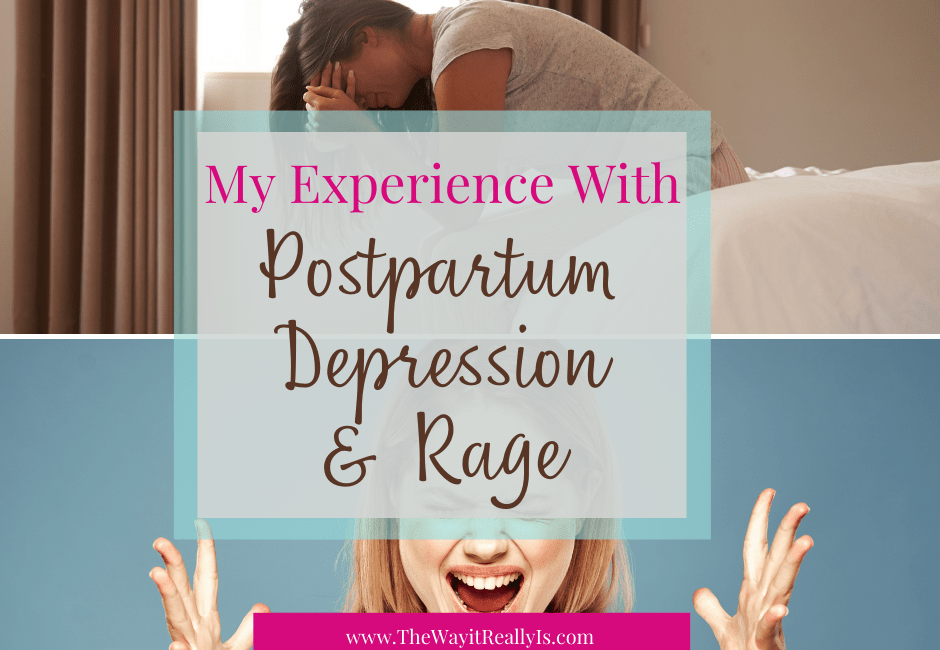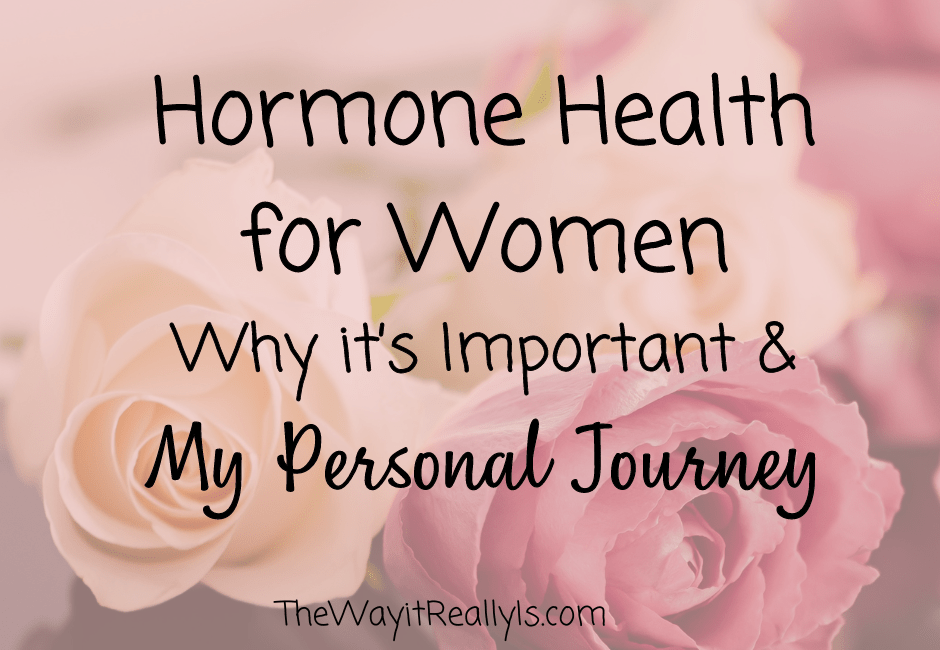Do you struggle with debilitating menstrual symptoms leading up to your period, much more severe than typical PMS? You may have Premenstrual Dysphoric Disorder (PMDD) which is a clinical diagnosis that is so much more than just Premenstrual Syndrome (PMS).
PMDD can make a woman go from calm to uncontrollable rage and feelings of hopelessness over the things that the week prior barely bothered her. I know this first hand because I go through it every month.
Disclaimer: I am not a doctor, I am just sharing my own experience with PMDD.
Disclaimer: The information provided on this blog is for general educational purposes only and is not intended as a substitute for professional medical advice, diagnosis, or treatment. Always seek the advice of your physician or other qualified healthcare provider with any questions you may have regarding a medical condition.
PMS vs PMDD
PMS generally consists of acne, moodiness, and bloating the week prior to a woman’s period. It is quite common as it affects 75% of premenopausal women. PMDD, on the other hand, is much more severe and affects only 3-8% of premenopausal women, according to WebMD. PMDD happens the week or two leading up to a period, and includes the symptoms of PMS. The differences are that there are significantly more symptoms, they are so severe that they disrupt the woman’s ability to function and complete everyday tasks, and the brain chemistry is altered.
Broadly speaking, if you have PMDD, you have an increased sensitivity to your reproductive hormones during the two weeks before your period starts. This sensitivity leads to alterations in the brain chemicals and neurologic pathways that control your mood and your general sense of well-being.
Written by Andrea Chisholm, M.D. on the Harvard Health Blog
Women are more at risk for developing PMDD if they have a personal or family history of depression, postpartum depression, or other mood disorders. No wonder I developed it since I have a personal history of depression and postpartum depression.
As you can see from the table below with information from Johns Hopkins Medicine, PMDD affects every aspect of a woman’s body, significantly more than PMS.
Finally, women’s health and PMDD are in the news as an executive order was recently signed to advance women’s health research and innovation. This is huge! News outlets are finally running stories about PMDD as well.
PMS vs PMDD Table of Symptoms
| PMS Symptoms | PMDD Symptoms |
|---|---|
| Psychological Symptoms Irritability Mood Swings Anxiety Trouble Sleeping Forgetfulness Trouble Concentrating Fluid Retention Bloating and fluid buildup Breast tenderness Gastrointestinal Symptoms Constipation or Diarrhea Skin Problems Acne Other Food cravings | Psychological symptoms Irritability Nervousness Lack of control Agitation Anger Insomnia Difficulty concentrating Depression Severe fatigue Anxiety Confusion Forgetfulness Poor self-image Paranoia Emotional sensitivity Crying spells Moodiness Trouble sleeping Fluid retention Swelling of the ankles, hands, and feet Periodic weight gain Diminished urine output Breast fullness and pain Respiratory problems Allergies Infections Eye complaints Vision changes Eye infection Gastrointestinal symptoms Abdominal cramps Bloating Constipation Nausea Vomiting Pelvic heaviness or pressure Backache Skin problems Acne Skin inflammation with itching Aggravation of other skin disorders, including cold sores Neurologic and vascular symptoms Headache Dizziness Fainting Numbness, prickling, tingling, or heightened sensitivity of arms and/or legs Easy bruising Heart palpitations Muscle spasms Other Decreased coordination Painful menstruation Diminished sex drive Appetite changes Food cravings Hot flashes |
What it’s Really Like
PMDD symptoms effect me in many ways. Things that didn’t bother me when I wasn’t in PMDD territory suddenly send me into a rage. When I’m experiencing PMDD symptoms I suddenly feel helpless about life and want to hurt myself. It’s terrifying.
Since I was diagnosed with postpartum depression back in 2019 and started antidepressants (again) after I needed more than therapy alone. They’ve worked well overall at leveling out my mood, reducing my suddenly intense rage, self-injurious behaviors, and suicidal ideation. However, for about one week a month, it’s like I’m not taking them at all. When I’m in PMDD territory I slip back into bouts of rage, self-injury, and suicidal thoughts. That’s about 1/4th of my existence I feel uncontrollable. I absolutely hate it.
The difference between this and normal depression is that as soon as I get my period, I basically snap back to normal. I regret everything I said or did and know that I really would never kill myself and am regretting if I hurt myself. It’s terrifying though to have this happen, I really try to control it but sometimes I can’t.
Through my research, I’ve found that I’m actually one of the lucky ones, believe it or not. Turns out that many women with PMDD suffer symptoms of it for most of the month, not just a week or so.
Ways to Cope with PMDD Symptoms
I’ve found that tracking my menstrual cycle helps sometimes, yet at other times it does not.
It does sometimes help me realize PMDD time is coming up so I know that I might be a bit off for a few days. Yet other months, knowing it’s coming actually makes it worse.
I’ve found that not keeping a close eye on when my next period is going to start tends to help. Then, if I notice a significant mood change, I check my period tracker app and often see that yep, I’m in PMDD territory. This way I don’t psych myself up, in a sense, for a bad week but if I am having a particularly rough week I can look back and see why.
When I’m not paying attention to when I’ll be in PMDD territory it’s kind of neat that once in a while I suddenly get my period and am surprised because I hadn’t had an exceptionally horrible week leading up to it! This rarely happens but is amazing when it does.
Other times I won’t be paying attention to when my period is coming but once it does I’ll realize “oh, ok, that’s why I was totally miserable yesterday.” The day before I actually get my period tends to be my worst day of the month.
When I do realize that I’m angrier than usual, more irritable, and/or self-injurious, I remind myself that my hormones are doing this to me and that it won’t be forever. I’ll get through this PMDD period and get out on the other side to have three weeks without these symptoms, hopefully.
I also am sure to let my husband know that I’ve noticed these changes in myself at that time and I will often apologize ahead of time for anything that may happen. This does NOT excuse my behavior or give me a free pass to be uncontrollable but at least we’re on the same page in terms of what’s going on in my body.
Using PMDD as a Teachable Moment
During this time I will try to give myself a bit more grace but also make myself take more breaks. For example, if I notice that I’m feeling out of control with my emotions, I’m more likely to retreat to my bedroom for a few minutes while I calm down. The children are always safe during this time as whenever I take a break they are all inside the house with me, but they know that if I walk off when I’m becoming angry that they just need to give me some time and space. They aren’t perfect at this of course, as they are young children, and often will try to antagonize me from a distance BUT I just need a couple of minutes then I rejoin them and calmly explain why I needed to walk away and how they should be respectful.
I also use this time to encourage them to walk away and take a break when they feel themselves getting angry with each other. I talk to them about how I could feel my body becoming tense, my breathing more rapid and overall I was becoming angry so I took a break instead of yelling. This is something we continue to work on with them but maybe someday they’ll be able to do it too. I mean heck, I’m 35 and I’m still figuring this out.
Possible Hope
Recently I came across an article from the Hopkins Medical Center that indicated taking a Magnesium and Calcium supplement may help lessen the severity of my PMDD symptoms. I had been on a Magnesium and Calcium supplement when I was pregnant with my first child so figured might as well start it up again, I probably need the calcium anyway.
Month 1 after starting it I actually felt like my symptoms were worse during PMDD time.
Month 2 though was the month I referenced earlier where I got my period and then was like Woah! I wasn’t even extra angry or hopeless last week, surprising!! So there might be some hope with the Magnesium Calcium supplement. If nothing else, it will help get more calcium to my osteoporosis-prone little bones (it runs in the family so I’m expecting I’ll get it).
Even if it doesn’t actually help with PMDD but it has a placebo effect on me, I’m totally ok with that.
Another thing that has really helped me is balancing my hormones. It’s helped with the pain especially, which you can read more about here.
A third thing that has helped me even more just leading up to my period is taking an anxiety medication the week leading up to my period, when my symptoms are at their worst. This has helped immensely!!
Resources
- PMDD vs. PMS from the Mayo Clinic
- Premenstrual dysphoria disorder: It’s biology, not a behavior choice
- Premenstrual Dysphoric Disorder from Hopkins Medical Center
- PMS vs PMDD from WebMD
Related Blog Post

As a mom of identical twins and a son two years older, I have gained invaluable experience in the realm, and chaos, of parenting. With a Master's Degree and Education Specialist Degree in School Psychology, I spent years as a school psychologist, helping children navigate through their educational and emotional challenges. Now as a stay at home mom and professional blogger, I combine my areas of expertise to help you in your parenting journey.



